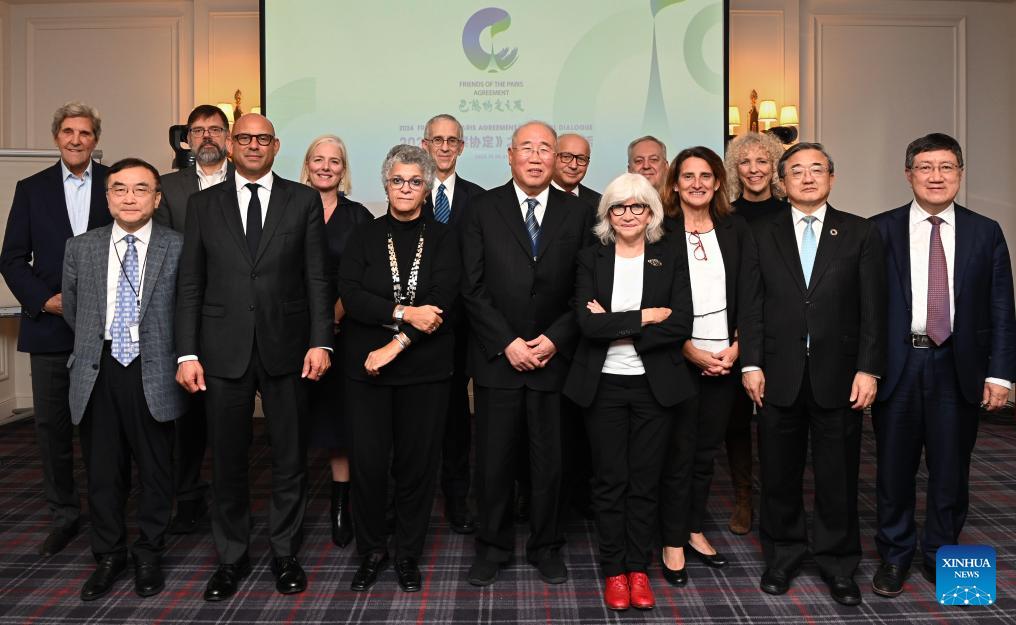
 0 Comment(s)
0 Comment(s) Print
Print E-mail China.org.cn, November 6, 2024
E-mail China.org.cn, November 6, 2024

Participants pose for a group photo during the sixth Friends of the Paris Agreement High-Level Dialogue in Paris, France, on Oct. 28, 2024. [Photo/The European Climate Foundation]
Climate change knows no borders and demands a coordinated global response. The 2015 Paris Agreement was a landmark achievement in multilateral climate governance, with countries pledging collective action to mitigate carbon emissions.
However, geopolitical tensions increasingly complicate the path to unified global climate action. Some nations are undermining international trust through protectionist policies and trade barriers driven by self-interest.
Amid this backdrop, the recent sixth Friends of the Paris Agreement High-Level Dialogue, held in Paris on Oct. 28-29, offered a platform to reflect on the progress and challenges of global climate cooperation.
In an exclusive interview with China.org.cn, Jiang Feng, a researcher at Shanghai International Studies University and chairman of the Shanghai Academy of Global Governance & Area Studies, emphasized that combating climate change requires international collaboration rather than divisive geopolitics.
He emphasized the need for stronger China-Europe cooperation, warning that recent countervailing duties on Chinese electric vehicles (EVs) could undermine global efforts to reduce emissions.
Jiang noted that the Paris Agreement established ambitious, binding targets for global carbon emissions reduction, reflecting a consensus on the urgency of climate action. China, instrumental in shaping and committing to the Paris goals, has made notable progress and received widespread recognition. However, not all countries are showing the same level of commitment; some engage in more rhetoric than action and politicize the transfer of technology.
Participants at the Paris meeting expressed concerns about the possible negative impact of the upcoming U.S. election on global emissions reduction efforts.
A key takeaway from the dialogue was the need to broaden the focus of climate measures beyond just emissions reduction targets. Jiang stressed that technological innovation, biodiversity preservation and energy structure transformation should also be prioritized.
"The Paris Agreement represents a shift – a need for humanity to transition from fossil fuels to renewable energy," he stated, calling it a historic opportunity for sustainable development.
Such a transition requires countries to rethink their development philosophies and models to address the core issues of climate change. Jiang pointed to China's investment in renewable energy as a key example. With strong policies, substantial investments, and technological innovation, China has fueled significant growth in renewables, supporting its economy while also aiding the global energy transition and emissions reduction.
Jiang also highlighted the ambitious goals set by the European Union and some member states in their fight against climate change. For example, Aachen in Germany and RWTH Aachen University aim for carbon neutrality by 2030 – 15 years ahead of Germany's national target. Jiang noted that this and other examples show a strong awareness among several countries in addressing climate change, bringing together governments, universities, businesses, and civil society.
Yet, despite significant achievements, many challenges remain, particularly in the transfer of green technology. "Many innovative technologies are not being fully utilized due to rising geopolitics and trade protectionism, which politicize and instrumentalize the transfer of essential technologies and products globally," Jiang lamented.
The EU's recent five-year imposition of countervailing duties on Chinese EVs illustrates this dilemma. Jiang stated that some countries have maliciously labeled China's success in the photovoltaic and electric vehicle sectors as "overcapacity." While the measure aims to give European manufacturers a "window" to strengthen their industries, experts fear it creates unnecessary barriers to technology exchange. Given that European industries require China's advanced EV technology, such measures may ultimately hinder both Europe's and global progress toward renewable energy. Instead of imposing trade restrictions, Jiang urged nations to create a supportive and collaborative environment for green technology transfer.
During the dialogue, Chinese representatives met with experts from the International Energy Agency and European institutions to discuss enhancing mutual understanding and cooperation.
Jiang emphasized the importance of China-Europe collaboration, suggesting that as key global players, they should jointly plan technology research, development, and transfer projects for third parties or other regions, making these technologies more market-oriented and industrialized.
"This can not only aid third-party countries and regions but also open up new opportunities for China-Europe collaboration, creating growth drivers for their relationship," he explained.
Go to Forum >>0 Comment(s)